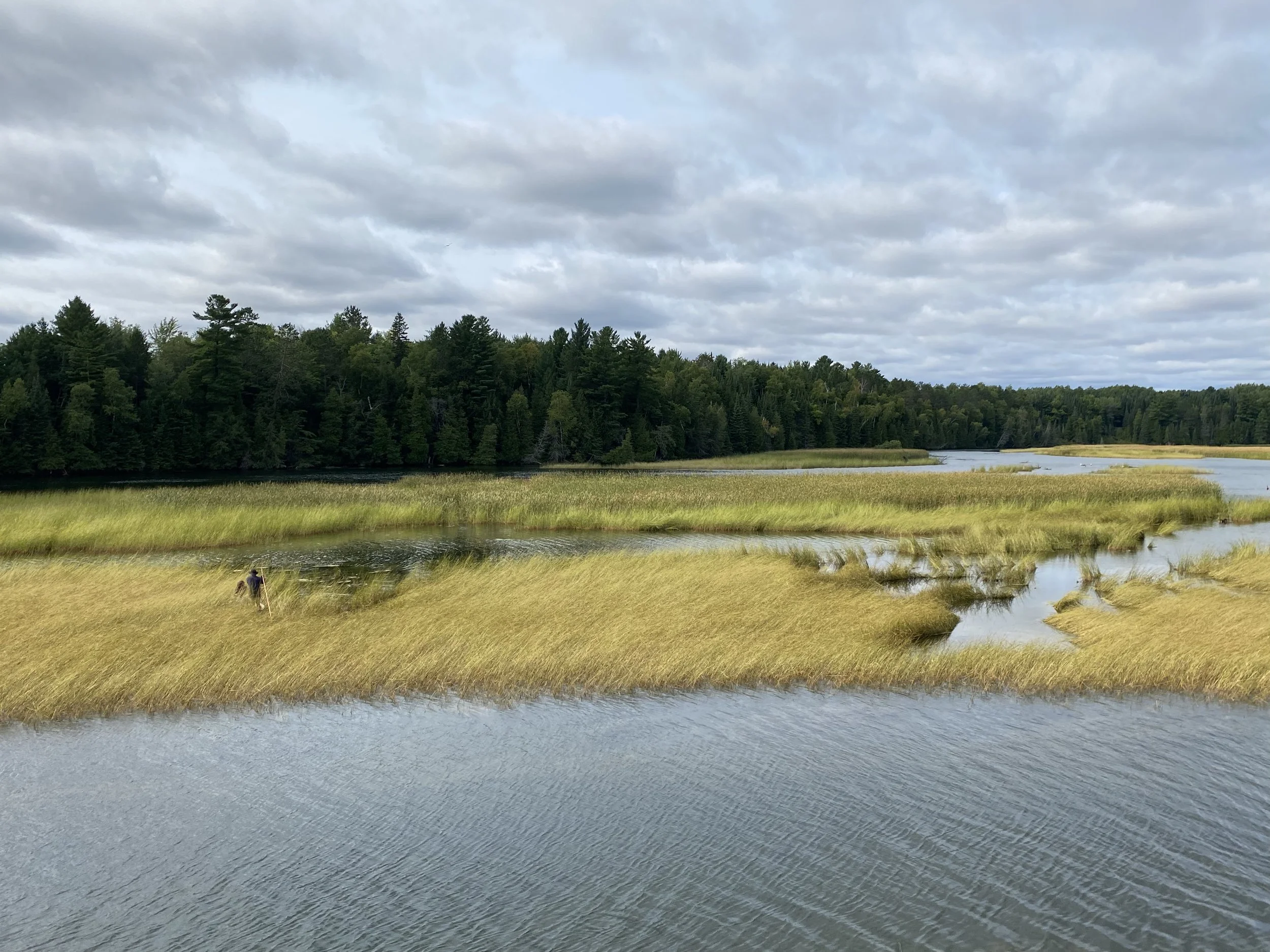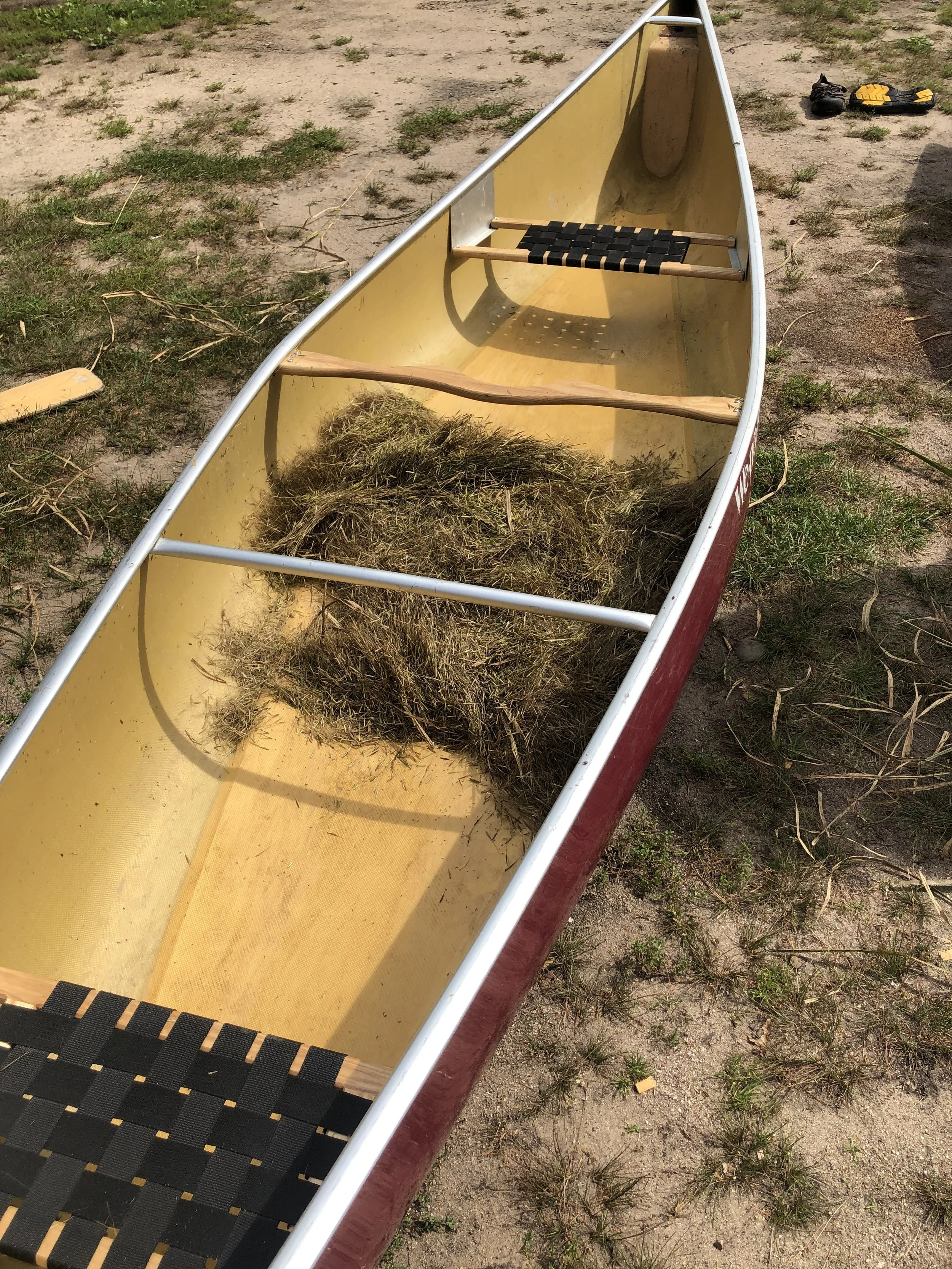Gun Lake Tribe Helps Mnomen Return to Local Waters
What is Mnomen?
Mnomen literally translates into good seed. But what is mnomen? In a temptation to oversimplify, one could define it merely as wild rice, but mnomen is much more than a food source, especially to citizens of Gun Lake Tribe.
A visit to the rice beds traditionally starts with an offering of sema, tobacco. Depending on the season, this is issued in combination with prayers, requests for permission to harvest, and statements of intention: This is for my family. This is for a ceremony. The relationship between Gun Lake Tribe citizens and mnomen isn’t exclusive to the harvest; it’s year round. Citizens visit the rice beds to put the rice to sleep every winter, and to wake it every spring. The process is not just about taking, far from it. “We’re trying to help the rice, not just feed ourselves. Revitalization is our main focus,” shared Mno Mijem Sovereignty Coordinator, Wyatt Szpliet.
At Ox-Bow
In 2020 the Environmental Administration of Gun Lake Tribe reached out to Ox-Bow and the Land Conservancy of West Michigan. The portion of the lagoon leading into the channel held all the markers of an area that might foster mnomen growth. Seeding efforts began that year and have continued on since. In future years, the hope is to create a sustainable rice bed that will not only be harvested for food, but will help ensure the preservation of mnomen itself.
History
“We consider the rice sacred,” Jeff Martin shared. The three tribe nations across Michigan all share the same heritage story of moving from East to West. The Great Spirit had told them through prophecy to look for the place where food grew on water. When they reached the Great Lakes, when they found mnomen… they knew they were home. This is one of the many reasons why mnomen is much more than just rice, it’s a fulfillment of the Great Spirit’s promise.
Harvest
The harvesting process takes place over about seven days. Many community members join both because of the cultural celebration that it is and because many hands make light work. It begins with gathering the rice into canoes. This process involves careful maneuvering, which is done not by paddle but by gajwéb’egen, a push pole. These cedar poles, usually hand carved, keep the root systems of the wild rice intact, whereas a paddle might damage the mnomen and other companion plants.
Shorter cedar poles, bwe’gen, or knockers, are used to knock the rice seed into the canoe. From there the seeds are transported via grain bags to a location where they can be parched within the week; this process prevents molding so the grains can be stored long term. After parching, hulling begins. Hullers wear a pair of mkeznen, shoes, reserved exclusively for this practice as they dance upon the mnomen and separate seed from its outer shell. The seed and husk are then winnowed, a process in which the mix is lightly tossed. The wind carries the husk away while the seed falls back into the birch winnowing basket. At this stage, the rice is ready to be cooked up or stored for the months to come.
Companion Plants & Invasives
When finding locations to seed mnomen, Szpliet shared they “want to keep it comfortable and companion planted.” This means scouting for areas with arrowhead plants and native cattails. Szpliet noted that the invasive purple loosestrife also shares similar preference to mnomen, but is notorious for out competing with the native species. Control of invasives such as purple loosestrife, non-native cattails, and phragmites are all vital to restoration efforts.
What happened to all the rice?
Wild lake and river rice once grew in abundance throughout Michigan, but began shrinking over time. It was just in the last 20 years that rice in Gun Lake stopped going to seed. What marked the change? Much of it has to do with water-based recreation such as speedboats, which harm the rice beds. Certain agricultural processes such as fertilizers also lead to increased algae blooms. What can be done to help? Szpliet and Martin emphasized the importance of spreading the word on how these practices harm mnomen. “We have to compete with nature already,” Szpliet said. Water Resource Specialist, Alex Wieten, also specified that increased regulations could help protect mnomen long term.
At the Table
Traditionally, every feast includes mnomen. When the youth council helped with the harvest preparations last year, they learned how to bundle the rice together to make an easier harvest later in the season. For each bundle they put prayers out and let the rice know who they were harvesting for, whether it be for their own family or for a larger celebration or ceremony such as the annual Pow Wow.
With the number of harvestable rice beds having diminished in prior years, many bands visit harvest sites on the land of other bands. When asking another band for permission to harvest, it’s common practice to offer sema. And when offers are accepted, the additional gift of a bundle of baskets, medicine, and the previous year’s harvest are often included.
Gun Lake Tribe
The Match-E-Be-Nash-She-Wish Band of Pottawatomi is a sovereign nation with powers of self-government, dedicated to upholding the values and culture of their elders. A key aspect of this includes carrying on traditions and protecting land and natural resources, as is evident in the seeding and harvesting efforts of mnomen. We’re so thankful for the investment Gun Lake Tribe has shown in the land and for the time they gave to teach us about the restoration efforts happening on the Ox-Bow Lagoon and throughout Michigan.
Ox-Bow sits on the unceded land of the Potawatomi, who called themselves Neshnabek, meaning “original people” or “true people.” We acknowledge the Potawatomi community, their elders both past and present, and their future generations as the original inhabitants of this land.
This article was written by Shanley Poole, Engagement Liaison & Storyteller, and shaped through conversation with Gun Lake Tribe’s Environmental Department and the following resources. We recommend taking the time to learn more by exploring them:
“Anam Manoomin’n” by Augustin of the Road
“Mnomen (Wild Rice)” A documentary short by Gun Lake Tribe.
“Mnomen - the Good Seed Re-Awakens,” A documentary short by the Tribal Environmental Advisory Council for the Nottawaseppi Huron Band of the Potawatomi.
Photos courtesy of Gun Lake Tribe.




